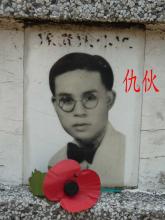26 Sep 1945, Chronology of Events Related to Stanley Civilian Internment Camp
Primary tabs
The China Mail (page 2) pays tribute to the Hong Kong resistance. It mentions David Loie, who contacted the BAAG at Waichow 'early' but states that, in general, 'Hong Komg's Heroes of the Fifth Column are nameless'.
The article goes on to claim that most resistance agents were Chinese, but that the Indians were well represented, and that no community of 'third nationals' (neutrals) that was more than half a dozen in size failed to produce at least one operative.
It quotes a Chinese interpreter/clerk who had access to the Gendarmerie files as saying that 2,000 people were executed for resistance activities and that 2,000 more were suspected. However, the real number of those involved, the writer believes, was 'legion'. Some were links in a chain of communication that extended from Gendarmerie HQ to outside Hong Kong, while others provided shelter for fugitives in a network organised by 'an American Chinese whose intelligence, wits and resources would rank with the best in the world'. A Jewish man, with the help of Chinese and Indian warders, managed to get nutritious food smuggled in 'to political prisoners as far as Canton'.
The writer belives that death wasn't the most frequent outcome but nervous breakdown - which might be followed by death from disease or suicide - or flight to Macau. Men would sometimes break down when asked to undertake some task that was beyond the limits of their courage. Traitors were rife in 1942 and 1943 as recruits had to be accepted without proper knowledge of their antecedents. However, the Gendarmerie were often confused by the number of aliases used, and secrecy within cells gave further protection.
The article goes on to list the great variety of tasks undertaken by the resistance. In conclusion, it points to the modesty of the former agents:
To-day (sic) the undergrounders have sunk underground. None will agree to having his name published and they mostly take the attitude that they don't particularly care to have their services to the Allied cause awarded official recognition.
Duncan Sloss, his son John, and Day Sage (Joyce) are among those leaving Hong Kong by plane for Britian.
Les Fisher begins 'spinal treatment' with Dr. Molthen.
Sources:
Sloss, Sage: China Mail, September 28, 1945, 4
Les Fisher, I Will Remember, 1996, 253
Notes:
1) I have not yet been able to identify the American-Chinese organiser of the 'safe house' network. I suspect that the Jewish man who smuggled food to political prisoners in Hong Kong and beyond was Boris Pasco, but I'm far from certain and any further information would be most welcome.
2) Frank Molthen and his wife Ruth introduced chiropractic to Hong Kong in the early 1930s. He is said to have treated both Chiang Kai-shek and Madame Chiang. In Stanley Molthen provided 'adjustments' for both internees and guards.
He was 'guaranteed out' of Stanley in August 1942:

